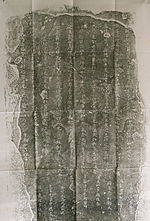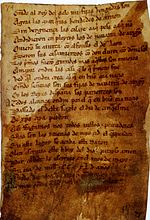course of Late Middle Japanese (see Late Middle Japanese adjectives), and now shii-adjectives are simply a form of i-adjectives. The distinction, although...
34 KB (3,530 words) - 19:53, 28 October 2023
nouns, becoming naru adjectives in Modern Japanese (analogous to taru adjectives), rather than na adjectives as most nari adjectival nouns did. These include...
22 KB (2,366 words) - 09:21, 27 August 2024
activities) nominal adjectives (names vary, also called na-adjectives or "adjectival nouns") verbs adjectives (so-called i-adjectives) More broadly, there...
126 KB (13,220 words) - 02:27, 12 July 2024
out, to emit"). There are three types of adjectives (see Japanese adjectives): 形容詞 keiyōshi, or i adjectives, which have a conjugating ending i (い) (such...
89 KB (10,155 words) - 18:26, 15 August 2024
closed class of adjectives, and new adjectives are not easily derived. Similarly, native Japanese adjectives (i-adjectives) are considered a closed class (as...
28 KB (3,619 words) - 13:45, 4 September 2024
remaining static in all conjugations. Conjugable words (verbs, i‑adjectives, and na‑adjectives) are traditionally considered to have six possible conjugational...
128 KB (6,447 words) - 09:42, 22 July 2024
sequence -ua- reducing to -a-: Many adjectival nouns of Early Middle Japanese were based on Old Japanese adjectives that were formed with suffixes -ka...
76 KB (6,698 words) - 22:46, 17 July 2024
Compound modifier (redirect from Compound adjectives)
spelling, as described in the main article. Japanese adjectives can compound. This is quite common for na-adjectives, which function essentially as attributive...
11 KB (1,367 words) - 04:03, 2 September 2024
up adjectival in Wiktionary, the free dictionary. Adjectival may refer to: Anything related to or serving as an adjective Adjectival noun (Japanese) Adjectival...
724 bytes (126 words) - 18:02, 2 April 2019
is 〜くれ -kure, rather than the expected ×くれろ *kurero. Japanese adjectives, specifically i-adjectives, function grammatically as verbs, though with more limited...
18 KB (2,162 words) - 10:03, 31 July 2024
Russian, Japanese and Chinese, prepositive adjectives are the norm (attributive adjectives normally come before the nouns they modify), and adjectives appear...
24 KB (2,790 words) - 19:36, 28 June 2024
Part of speech (category Articles containing Japanese-language text)
periphrastically. In Japanese, verbs and adjectives are closed classes, though these are quite large, with about 700 adjectives, and verbs have opened...
31 KB (3,594 words) - 12:49, 19 August 2024
politeness as Japanese does. Demonstratives in Yilan Creole derive from Japanese. Adjectives and adverbs in Yilan Creole derive from both Japanese and Atayal...
19 KB (1,960 words) - 00:14, 10 August 2024
Okurigana (category Articles containing Japanese-language text)
inflect adjectives or verbs was first used by Korean scribes in the form of gugyeol, and later spread to Japan. When used to inflect an adjective or verb...
36 KB (4,736 words) - 18:36, 9 August 2024
that Japanese adjectives are translated not to English adjectives, but to English predicates, as this is how they function grammatically in Japanese when...
8 KB (728 words) - 13:28, 2 August 2024
be applied to only a handful of verbs or adjectives. In the examples below, the classified verb or adjective is placed in square brackets. * Unlike the...
10 KB (991 words) - 19:24, 6 June 2024
important, and right. Adjectives head adjective phrases, and the most typical members function as modifiers in noun phrases. Most adjectives either inflect for...
32 KB (4,144 words) - 17:09, 29 August 2024
food). Collateral adjectives contrast with derived (denominal) adjectives. For the noun father, for example, there is a derived adjective fatherly in addition...
7 KB (878 words) - 18:09, 14 August 2024
Modern Japanese, partly a result of the merger of the conclusive and attributive forms. There were two types of adjectives: regular adjectives and adjectival...
23 KB (2,036 words) - 20:34, 8 August 2024
("red") → rojo, roja, rojos, rojas Adjectives whose lemma does not end in -o, however, inflect differently. These adjectives almost always inflect only for...
13 KB (1,391 words) - 15:26, 22 July 2024
s-irregular. There were two types of adjectives: regular adjectives and adjectival nouns. Historically, adjectives were subdivided into two classes: those...
11 KB (647 words) - 11:43, 20 April 2024
first adjective to show coordination of adjectives. Below is a simple example of adjectival coordination in Japanese. In (3), both adjectives are i-adjectives...
35 KB (4,834 words) - 22:53, 26 November 2023
Japanese particles, joshi (助詞) or tenioha (てにをは), are suffixes or short words in Japanese grammar that immediately follow the modified noun, verb, adjective...
59 KB (1,747 words) - 21:41, 20 August 2024
exhaustive list of words. Japanese verb conjugation Honorific speech in Japanese Japanese adjectives Japanese particles Japanese grammar 五段活用 Banno, Eri;...
28 KB (2,141 words) - 12:39, 31 August 2024
Adjectival noun may refer to: Adjectival noun (Japanese), also called adjectival or na-adjective Noun adjunct, a noun that qualifies another noun, like...
393 bytes (81 words) - 16:22, 29 October 2017
Attributive verb (redirect from Verbal adjective)
grammatically like ordinary adjectives, with no verb-like features) may be distinguished as deverbal adjectives. An example of a verbal adjective with verb-like features...
8 KB (1,119 words) - 04:49, 4 April 2024
predicative adjectives.) That is, they take an ending that depends on the gender, case, and number of the noun phrase. German adjectives take different...
9 KB (932 words) - 01:37, 7 September 2023
in Occupation Japan, by J. Marshall Unger. The 20th Century Japanese Writing System: Reform and Change by Christopher Seeley Japanese Hiragana Conversion...
36 KB (4,203 words) - 14:19, 17 August 2024
Modal adjectives are adjectives, such as likely, probable and necessary, that express modality, i.e., possibility, necessity, or contingency. Modal adjectives...
3 KB (408 words) - 10:56, 4 July 2024
Oshibori (category Articles containing Japanese-language text)
from the Japanese te (手) (hand) and fuku (拭く), to wipe. In mah-jong parlors, the words atsushibo and tsumeshibo, from the Japanese adjectives atsui (熱い)...
5 KB (672 words) - 10:49, 18 April 2024








